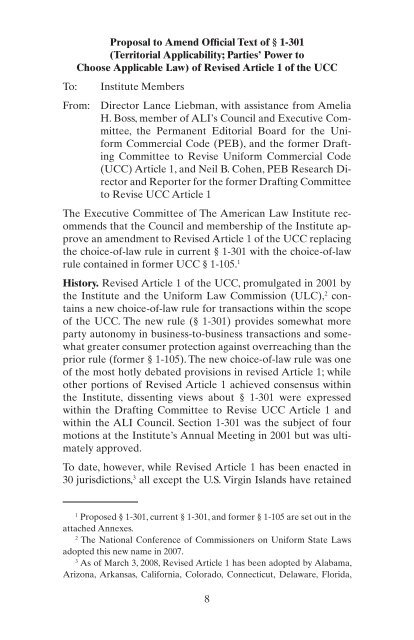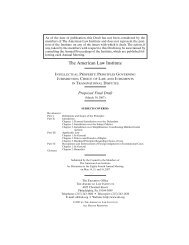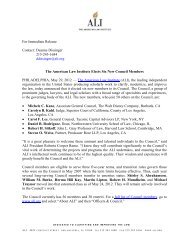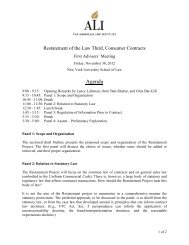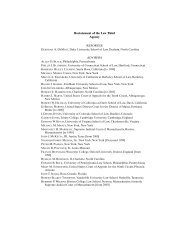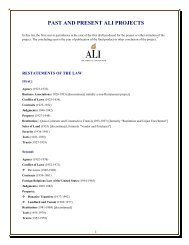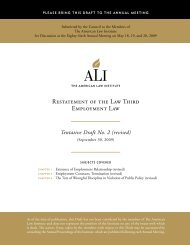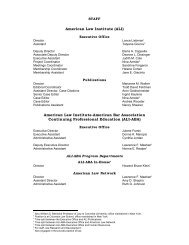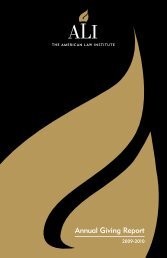Proposal to Amend Official Text of § 1-301 - American Law Institute
Proposal to Amend Official Text of § 1-301 - American Law Institute
Proposal to Amend Official Text of § 1-301 - American Law Institute
Create successful ePaper yourself
Turn your PDF publications into a flip-book with our unique Google optimized e-Paper software.
To:<br />
<strong>Proposal</strong> <strong>to</strong> <strong>Amend</strong> <strong>Official</strong> <strong>Text</strong> <strong>of</strong> § 1-<strong>301</strong><br />
(Terri<strong>to</strong>rial Applicability; Parties’ Power <strong>to</strong><br />
Choose Applicable <strong>Law</strong>) <strong>of</strong> Revised Article 1 <strong>of</strong> the UCC<br />
<strong>Institute</strong> Members<br />
From: Direc<strong>to</strong>r Lance Liebman, with assistance from Amelia<br />
H. Boss, member <strong>of</strong> ALI’s Council and Executive Committee,<br />
the Permanent Edi<strong>to</strong>rial Board for the Uniform<br />
Commercial Code (PEB), and the former Drafting<br />
Committee <strong>to</strong> Revise Uniform Commercial Code<br />
(UCC) Article 1, and Neil B. Cohen, PEB Research Direc<strong>to</strong>r<br />
and Reporter for the former Drafting Committee<br />
<strong>to</strong> Revise UCC Article 1<br />
The Executive Committee <strong>of</strong> The <strong>American</strong> <strong>Law</strong> <strong>Institute</strong> recommends<br />
that the Council and membership <strong>of</strong> the <strong>Institute</strong> approve<br />
an amendment <strong>to</strong> Revised Article 1 <strong>of</strong> the UCC replacing<br />
the choice-<strong>of</strong>-law rule in current § 1-<strong>301</strong> with the choice-<strong>of</strong>-law<br />
rule contained in former UCC § 1-105. 1<br />
His<strong>to</strong>ry. Revised Article 1 <strong>of</strong> the UCC, promulgated in 2001 by<br />
the <strong>Institute</strong> and the Uniform <strong>Law</strong> Commission (ULC), 2 contains<br />
a new choice-<strong>of</strong>-law rule for transactions within the scope<br />
<strong>of</strong> the UCC. The new rule (§ 1-<strong>301</strong>) provides somewhat more<br />
party au<strong>to</strong>nomy in business-<strong>to</strong>-business transactions and somewhat<br />
greater consumer protection against overreaching than the<br />
prior rule (former § 1-105). The new choice-<strong>of</strong>-law rule was one<br />
<strong>of</strong> the most hotly debated provisions in revised Article 1; while<br />
other portions <strong>of</strong> Revised Article 1 achieved consensus within<br />
the <strong>Institute</strong>, dissenting views about § 1-<strong>301</strong> were expressed<br />
within the Drafting Committee <strong>to</strong> Revise UCC Article 1 and<br />
within the ALI Council. Section 1-<strong>301</strong> was the subject <strong>of</strong> four<br />
motions at the <strong>Institute</strong>’s Annual Meeting in 2001 but was ultimately<br />
approved.<br />
To date, however, while Revised Article 1 has been enacted in<br />
30 jurisdictions, 3 all except the U.S. Virgin Islands have retained<br />
1<br />
Proposed § 1-<strong>301</strong>, current § 1-<strong>301</strong>, and former § 1-105 are set out in the<br />
attached Annexes.<br />
2<br />
The National Conference <strong>of</strong> Commissioners on Uniform State <strong>Law</strong>s<br />
adopted this new name in 2007.<br />
3<br />
As <strong>of</strong> March 3, 2008, Revised Article 1 has been adopted by Alabama,<br />
Arizona, Arkansas, California, Colorado, Connecticut, Delaware, Florida,<br />
8
the choice-<strong>of</strong>-law rule from former § 1-105 (renumbering it, in<br />
most cases, as § 1-<strong>301</strong>) rather than enacting the revised rule in the<br />
<strong>Official</strong> <strong>Text</strong> <strong>of</strong> § 1-<strong>301</strong>. This has led <strong>to</strong> an unfortunate situation:<br />
the “uniform” version <strong>of</strong> the UCC as promulgated by the <strong>Institute</strong><br />
and the ULC is not the version that has been “uniformly”<br />
adopted. In fact, in all 50 states the substance <strong>of</strong> former § 1-105<br />
is the law; it is only in the U.S. Virgin Islands that the “uniform”<br />
version is followed. 4<br />
At its November 3, 2007 meeting, the Permanent Edi<strong>to</strong>rial<br />
Board for the Uniform Commercial Code (PEB) recommended<br />
that the <strong>Official</strong> <strong>Text</strong> <strong>of</strong> UCC § 1-<strong>301</strong> be amended by reverting<br />
<strong>to</strong> the choice-<strong>of</strong>-law rule <strong>of</strong> former UCC § 1-105. Acting under<br />
the ULC constitution, 5 the Executive Committee <strong>of</strong> the ULC<br />
accepted that recommendation and, at its meeting on January<br />
12, 2008, approved the proposed § 1-<strong>301</strong> set out in the attached<br />
Annex 1. Since no objection was filed by any ULC commissioner<br />
within the objection period, that amendment is deemed approved<br />
by the ULC as a whole.<br />
The Executive Committee <strong>of</strong> the <strong>Institute</strong> considered the proposed<br />
amendment at its meeting on February 27, 2007. With all<br />
members in attendance and without dissent, the Committee recommended<br />
the amendment. It will be before the Council at its<br />
meeting on May 19 and, if then approved, will go <strong>to</strong> the Annual<br />
Hawaii, Idaho, Indiana, Iowa, Kansas, Kentucky, Louisiana, Minnesota,<br />
Montana, Nebraska, Nevada, New Hampshire, New Mexico, North Carolina,<br />
North Dakota, Oklahoma, Rhode Island, Texas, U.S. Virgin Islands, Utah,<br />
Virginia, and West Virginia.<br />
4<br />
To encourage enactment <strong>of</strong> Article 1 even in states that are not inclined<br />
<strong>to</strong> adopt the <strong>Official</strong> <strong>Text</strong> <strong>of</strong> § 1-<strong>301</strong>, the ULC has been supplying the legislatures<br />
<strong>of</strong> such states a version <strong>of</strong> § 1-<strong>301</strong> essentially identical <strong>to</strong> the amendment<br />
recommended in this proposal as a “hip pocket” amendment <strong>to</strong> the<br />
<strong>Official</strong> <strong>Text</strong>.<br />
5<br />
Section 4.3(b)(3) <strong>of</strong> the ULC constitution permits the Executive Committee<br />
<strong>to</strong> approve amendments <strong>to</strong> uniform acts between Annual Meetings<br />
<strong>of</strong> the ULC if the amendments are “desirable <strong>to</strong> remove an ambiguity,<br />
. . . <strong>to</strong> meet an unanticipated objection, <strong>to</strong> conform the Act <strong>to</strong> a trend <strong>of</strong> judicial<br />
decisions, or <strong>to</strong> achieve a similar objective.” The ULC’s Executive Committee<br />
concluded that adopting the proposed amendment <strong>to</strong> Article 1 was<br />
appropriate under that provision. The <strong>Institute</strong> does not have a comparable<br />
procedure; substantive changes <strong>to</strong> <strong>Institute</strong> products require concurrence <strong>of</strong><br />
the Council and the membership.<br />
9
Meeting for the membership’s consideration and approval on<br />
May 21.<br />
Issues raised by Revised § 1-<strong>301</strong>. Section 1-<strong>301</strong> represented a significant<br />
rethinking <strong>of</strong> choice-<strong>of</strong>-law issues for transactions within<br />
the scope <strong>of</strong> the UCC, changing both the rules governing the<br />
power <strong>of</strong> parties <strong>to</strong> select the jurisdiction whose law will govern<br />
their transaction and the rules determining the governing law in<br />
the absence <strong>of</strong> such selection by the parties. With respect <strong>to</strong> the<br />
power <strong>to</strong> select governing law, § 1-<strong>301</strong> affords somewhat greater<br />
party au<strong>to</strong>nomy than does former § 1-105 but with important<br />
safeguards protecting consumer interests and fundamental public<br />
policies.<br />
While former § 1-105 allows the parties <strong>to</strong> a transaction <strong>to</strong> designate<br />
a jurisdiction whose law governs a transaction only if the<br />
transaction bears a “reasonable relation” <strong>to</strong> that jurisdiction,<br />
more recent examinations <strong>of</strong> this issue have moved in the direction<br />
<strong>of</strong> greater party au<strong>to</strong>nomy <strong>to</strong> designate the governing law<br />
within certain limits. Section 187(2) <strong>of</strong> the Restatement Second<br />
<strong>of</strong> Conflict <strong>of</strong> <strong>Law</strong>s (1971, amended 1988) provides more party<br />
au<strong>to</strong>nomy than does former § 1-105 (by allowing designation <strong>of</strong><br />
a jurisdiction’s law not only if the transaction bears a reasonable<br />
relation <strong>to</strong> the jurisdiction but also if there is a reasonable basis<br />
for the parties’ choice); however, it explicitly limits that au<strong>to</strong>nomy<br />
when the designated law would <strong>of</strong>fend a fundamental policy<br />
<strong>of</strong> the jurisdiction whose law would govern in the absence <strong>of</strong> the<br />
designation. Subsequently emerging international norms foster<br />
even more party au<strong>to</strong>nomy than provided in the Restatement<br />
while adding additional protections for consumer transactions.<br />
Following the international trend, § 1-<strong>301</strong> goes further than the<br />
Restatement in its basic principles <strong>of</strong> party au<strong>to</strong>nomy but accompanies<br />
that development with both the Restatement’s limitations<br />
relating <strong>to</strong> public policy and additional protections for<br />
consumer transactions.<br />
In the context <strong>of</strong> business-<strong>to</strong>-business transactions, § 1-<strong>301</strong> generally<br />
provides the parties with greater au<strong>to</strong>nomy <strong>to</strong> designate<br />
a jurisdiction whose law will govern than does former § 1-105<br />
by deleting that section’s requirement that the transaction bear<br />
a “reasonable relation” <strong>to</strong> the chosen jurisdiction but following<br />
the lead <strong>of</strong> the Restatement by providing that the designation <strong>of</strong><br />
a jurisdiction’s law is not effective (even if the transaction bears<br />
a reasonable relation <strong>to</strong> that jurisdiction) if application <strong>of</strong> that<br />
10
law would be contrary <strong>to</strong> a fundamental policy <strong>of</strong> the jurisdiction<br />
whose law would otherwise govern.<br />
In the context <strong>of</strong> consumer transactions, the language <strong>of</strong> § 1-<br />
<strong>301</strong>, unlike that <strong>of</strong> former § 1-105, explicitly protects consumers<br />
against the possibility <strong>of</strong> losing the protection <strong>of</strong> consumer-protection<br />
rules, a result <strong>of</strong>ten achieved in practice under former<br />
§ 1-105.<br />
Section 1-<strong>301</strong>(d) also addresses another issue arising under former<br />
§ 1-105. In the absence <strong>of</strong> an effective contractual designation<br />
<strong>of</strong> governing law, former § 1-105(1) directs the forum <strong>to</strong> apply its<br />
own law <strong>to</strong> a transaction if it bears “an appropriate relation <strong>to</strong><br />
this state.” In this situation, though, many courts simply apply the<br />
forum’s general choice-<strong>of</strong>-law principles, either ignoring the language<br />
<strong>of</strong> § 1-105 or interpreting its requirement <strong>of</strong> an “appropriate”<br />
relation as invoking the forum’s general principles. Section<br />
1-<strong>301</strong> follows the approach adopted by these courts and provides<br />
that, in the absence <strong>of</strong> an effective contractual designation, the<br />
forum should apply the forum’s general choice-<strong>of</strong>-law principles,<br />
subject <strong>to</strong> certain special rules in consumer transactions.<br />
Reasons for recommended change. As noted above, during the<br />
process that led <strong>to</strong> approval <strong>of</strong> Revised Article 1 by the <strong>Institute</strong><br />
and the ULC, § 1-<strong>301</strong> proved <strong>to</strong> be somewhat controversial.<br />
Concerns were raised that the expanded party au<strong>to</strong>nomy <strong>to</strong><br />
choose applicable law was at variance with the formulation in<br />
the Restatement Second <strong>of</strong> Conflict <strong>of</strong> <strong>Law</strong>s, 6 was overbroad, 7<br />
and might be unconstitutional. 8 Moreover, some argued that the<br />
expanded consumer-protection provisions and the “fundamental<br />
policy” limitation on the designation <strong>of</strong> governing law could<br />
place excessive limits on party au<strong>to</strong>nomy. This controversy continued<br />
during the first several enactments, with large commercial<br />
interests (primarily bankers’ associations) lobbying against<br />
§ 1-<strong>301</strong>, sometimes joined by those who were concerned that the<br />
section might validate choice-<strong>of</strong>-law clauses that would result in<br />
6<br />
Restatement Second, Conflict <strong>of</strong> <strong>Law</strong>s § 187(2) (1969).<br />
7<br />
William J. Woodward, Jr., Contractual Choice <strong>of</strong> <strong>Law</strong>: Legislative Choice<br />
in an Era <strong>of</strong> Party Au<strong>to</strong>nomy, 54 SMU L. Rev. 697, 740 (2001).<br />
8<br />
See generally Richard K. Greenstein, Is the Proposed U.C.C. Choice <strong>of</strong><br />
<strong>Law</strong> Provision Unconstitutional?, 73 Temp. L. Rev. 1159 (2000).<br />
11
application <strong>of</strong> UCITA as enacted in Virginia or Maryland. 9 The<br />
result was that all <strong>of</strong> the early enactments <strong>of</strong> Revised Article 1<br />
(except in the U.S. Virgin Islands) rejected § 1-<strong>301</strong> in favor <strong>of</strong><br />
former § 1-105. The decisions <strong>of</strong> these early enacting states set a<br />
pattern that other enacting states have been unwilling <strong>to</strong> break.<br />
The result, as noted earlier, is that all 29 enacting states have<br />
retained the substance <strong>of</strong> former § 1-105.<br />
In the context <strong>of</strong> the drafting <strong>of</strong> Restatements and Principles <strong>of</strong><br />
the <strong>Law</strong>, the <strong>Institute</strong> takes pride in articulating what it considers<br />
<strong>to</strong> be the “better” proposition <strong>of</strong> law. The drafting <strong>of</strong> the UCC,<br />
however, implicates issues not present in the preparation <strong>of</strong> Restatements<br />
and Principles. First, the preparation <strong>of</strong> a uniform act<br />
requires that considerations <strong>of</strong> enactability, while not determinative,<br />
be taken in<strong>to</strong> account. Second, the UCC is a joint enterprise,<br />
undertaken with the ULC, the entity with the responsibility for<br />
promoting UCC enactments in the states. Consequently, while<br />
it would not be appropriate <strong>to</strong> seek revision <strong>of</strong> a Restatement<br />
provision merely because it has been rejected by some courts, it<br />
is important <strong>to</strong> the integrity <strong>of</strong> the UCC process that both the <strong>Institute</strong><br />
and the ULC concur in proposing and promoting a product<br />
that is capable <strong>of</strong> achieving broad enactment. Failure <strong>to</strong> meet<br />
that standard has led <strong>to</strong> UCC revisions in the past. 10 Unfortunately,<br />
we now know that § 1-<strong>301</strong> has not met that standard. This<br />
is the basis for the recommendation by the <strong>Institute</strong>’s Executive<br />
Committee that the Council and the membership adopt the revision<br />
<strong>to</strong> § 1-<strong>301</strong> as proposed by the PEB.<br />
If, as expected, the Council approves the Executive Committee’s<br />
recommendation when it meets on May 19, the proposal<br />
<strong>to</strong> amend § 1-<strong>301</strong> will be presented for consideration and action<br />
at the Annual Meeting at 2:00 p.m. on Wednesday, May 21. Pr<strong>of</strong>essor<br />
Neil Cohen, the Research Direc<strong>to</strong>r for the PEB and the<br />
9<br />
See, e.g., Keith A. Rowley, The Often Imitated, But Not Yet Duplicated,<br />
Revised Uniform Commercial Code Article 1, 38 UCC L.J. 195 (2006).<br />
10<br />
The original 1952 <strong>Official</strong> <strong>Text</strong> <strong>of</strong> the UCC achieved only one enactment<br />
in the five years after its promulgation. This state <strong>of</strong> affairs, augmented<br />
by calls for revision, resulted in the promulgation <strong>of</strong> a substantially revised<br />
1958 draft that garnered much more support. The UCC was amended still<br />
further in 1962. Similarly, Article 2A, the first new Article <strong>of</strong> the UCC since<br />
its original promulgation, had been enacted in only a few states when the<br />
1987 text was replaced with a new 1990 text that rewrote some problematic<br />
provisions.<br />
12
Reporter for the Drafting Committee <strong>to</strong> Revise UCC Article 1,<br />
will be on the dais <strong>to</strong> help present the matter <strong>to</strong> the membership<br />
and <strong>to</strong> address any questions.<br />
Annex 1<br />
Proposed UCC § 1-<strong>301</strong><br />
§ 1-<strong>301</strong>. Terri<strong>to</strong>rial Applicability; Parties’ Power <strong>to</strong> Choose Applicable<br />
<strong>Law</strong>.<br />
(a) Except as otherwise provided in this section, when a<br />
transaction bears a reasonable relation <strong>to</strong> this state and also <strong>to</strong><br />
another state or nation the parties may agree that the law either<br />
<strong>of</strong> this state or <strong>of</strong> such other state or nation shall govern their<br />
rights and duties.<br />
(b) In the absence <strong>of</strong> an agreement effective under subsection<br />
(a), and except as provided in subsection (c), [the Uniform<br />
Commercial Code] applies <strong>to</strong> transactions bearing an appropriate<br />
relation <strong>to</strong> this state.<br />
(c) If one <strong>of</strong> the following provisions <strong>of</strong> [the Uniform<br />
Commercial Code] specifies the applicable law, that provision<br />
governs and a contrary agreement is effective only <strong>to</strong> the extent<br />
permitted by the law so specified:<br />
(1) Section 2-402;<br />
(2) Sections 2A-105 and 2A-106;<br />
(3) Section 4-102;<br />
(4) Section 4A-507;<br />
(5) Section 5-116;<br />
[(6) Section 6-103;]<br />
(7) Section 8-110;<br />
(8) Sections 9-<strong>301</strong> through 9-307.<br />
<strong>Official</strong> Comment<br />
Source: Former Section 1-105<br />
Changes from former law: This section is substantively<br />
identical <strong>to</strong> former Section 1-105. Changes in language are stylistic<br />
only.<br />
This section is subject <strong>to</strong> Section 1-102, which states the<br />
scope <strong>of</strong> Article 1. As that section indicates, the rules <strong>of</strong> Article<br />
1, including this section, apply <strong>to</strong> a transaction <strong>to</strong> the extent that<br />
13
transaction is governed by one <strong>of</strong> the other Articles <strong>of</strong> the Uniform<br />
Commercial Code.<br />
Annex 2<br />
Current UCC § 1-<strong>301</strong><br />
§ 1-<strong>301</strong>. Terri<strong>to</strong>rial Applicability; Parties’ Power <strong>to</strong> Choose<br />
Applicable <strong>Law</strong>.<br />
(a) In this section:<br />
(1) “Domestic transaction” means a transaction other<br />
than an international transaction.<br />
(2) “International transaction” means a transaction that<br />
bears a reasonable relation <strong>to</strong> a country other than<br />
the United States.<br />
(b) This section applies <strong>to</strong> a transaction <strong>to</strong> the extent that<br />
it is governed by another article <strong>of</strong> the [Uniform Commercial<br />
Code].<br />
(c) Except as otherwise provided in this section:<br />
(1) an agreement by parties <strong>to</strong> a domestic transaction<br />
that any or all <strong>of</strong> their rights and obligations are <strong>to</strong><br />
be determined by the law <strong>of</strong> this State or <strong>of</strong> another<br />
State is effective, whether or not the transaction bears<br />
a relation <strong>to</strong> the State designated; and<br />
(2) an agreement by parties <strong>to</strong> an international transaction<br />
that any or all <strong>of</strong> their rights and obligations are<br />
<strong>to</strong> be determined by the law <strong>of</strong> this State or <strong>of</strong> another<br />
State or country is effective, whether or not the transaction<br />
bears a relation <strong>to</strong> the State or country designated.<br />
(d) In the absence <strong>of</strong> an agreement effective under subsection<br />
(c), and except as provided in subsections (e) and (g), the<br />
rights and obligations <strong>of</strong> the parties are determined by the law<br />
that would be selected by application <strong>of</strong> this State’s conflict <strong>of</strong><br />
laws principles.<br />
(e) If one <strong>of</strong> the parties <strong>to</strong> a transaction is a consumer, the<br />
following rules apply:<br />
14
(1) An agreement referred <strong>to</strong> in subsection (c) is not effective<br />
unless the transaction bears a reasonable relation<br />
<strong>to</strong> the State or country designated.<br />
(2) Application <strong>of</strong> the law <strong>of</strong> the State or country determined<br />
pursuant <strong>to</strong> subsection (c) or (d) may not deprive<br />
the consumer <strong>of</strong> the protection <strong>of</strong> any rule <strong>of</strong><br />
law governing a matter within the scope <strong>of</strong> this section,<br />
which both is protective <strong>of</strong> consumers and may<br />
not be varied by agreement:<br />
(A) <strong>of</strong> the State or country in which the consumer<br />
principally resides, unless subparagraph (B) applies; or<br />
(B) if the transaction is a sale <strong>of</strong> goods, <strong>of</strong> the State<br />
or country in which the consumer both makes the contract<br />
and takes delivery <strong>of</strong> those goods, if such State or country<br />
is not the State or country in which the consumer principally<br />
resides.<br />
(f) An agreement otherwise effective under subsection<br />
(c) is not effective <strong>to</strong> the extent that application <strong>of</strong> the law <strong>of</strong> the<br />
State or country designated would be contrary <strong>to</strong> a fundamental<br />
policy <strong>of</strong> the State or country whose law would govern in the<br />
absence <strong>of</strong> agreement under subsection (d).<br />
(g) To the extent that [the Uniform Commercial Code]<br />
governs a transaction, if one <strong>of</strong> the following provisions <strong>of</strong> [the<br />
Uniform Commercial Code] specifies the applicable law, that<br />
provision governs and a contrary agreement is effective only <strong>to</strong><br />
the extent permitted by the law so specified:<br />
(1) Section 2-402;<br />
(2) Sections 2A-105 and 2A-106;<br />
(3) Section 4-102;<br />
(4) Section 4A-507;<br />
(5) Section 5-116;<br />
[(6) Section 6-103;]<br />
(7) Section 8-110;<br />
(8) Sections 9-<strong>301</strong> through 9-307.<br />
<strong>Official</strong> Comment<br />
[intentionally omitted]<br />
15
Annex 3<br />
Former UCC § 1-105<br />
§ 1-105. Terri<strong>to</strong>rial Applicability <strong>of</strong> the Act; Parties’ Power <strong>to</strong><br />
Choose Applicable <strong>Law</strong>.<br />
(1) Except as provided hereafter in this section, when a<br />
transaction bears a reasonable relation <strong>to</strong> this state and also <strong>to</strong><br />
another state or nation the parties may agree that the law either<br />
<strong>of</strong> this state or <strong>of</strong> such other state or nation shall govern<br />
their rights and duties. Failing such agreement this Act applies <strong>to</strong><br />
transactions bearing an appropriate relation <strong>to</strong> this state.<br />
(2) Where one <strong>of</strong> the following provisions <strong>of</strong> this Act<br />
specifies the applicable law, that provision governs and a contrary<br />
agreement is effective only <strong>to</strong> the extent permitted by the<br />
law (including the conflict <strong>of</strong> laws rules) so specified:<br />
Rights <strong>of</strong> credi<strong>to</strong>rs against sold goods. Section 2-402.<br />
Applicability <strong>of</strong> the Article on Leases. Sections 2A-105<br />
and 2A-106.<br />
Applicability <strong>of</strong> the Article on Bank Deposits and Collections.<br />
Section 4-102.<br />
Governing law in the Article on Funds Transfers. Section<br />
4A-507.<br />
Letters <strong>of</strong> Credit. Section 5-116.<br />
[Bulk sales subject <strong>to</strong> the Article on Bulk Sales. Section<br />
6-103.]<br />
Applicability <strong>of</strong> the Article on Investment Securities.<br />
Section 8-110.<br />
<strong>Law</strong> governing perfection, the effect <strong>of</strong> perfection or<br />
nonperfection, and the priority <strong>of</strong> security interests and agricultural<br />
liens. Sections 9-<strong>301</strong> through 9-307.<br />
<strong>Official</strong> Comment<br />
[intentionally omitted]<br />
16


